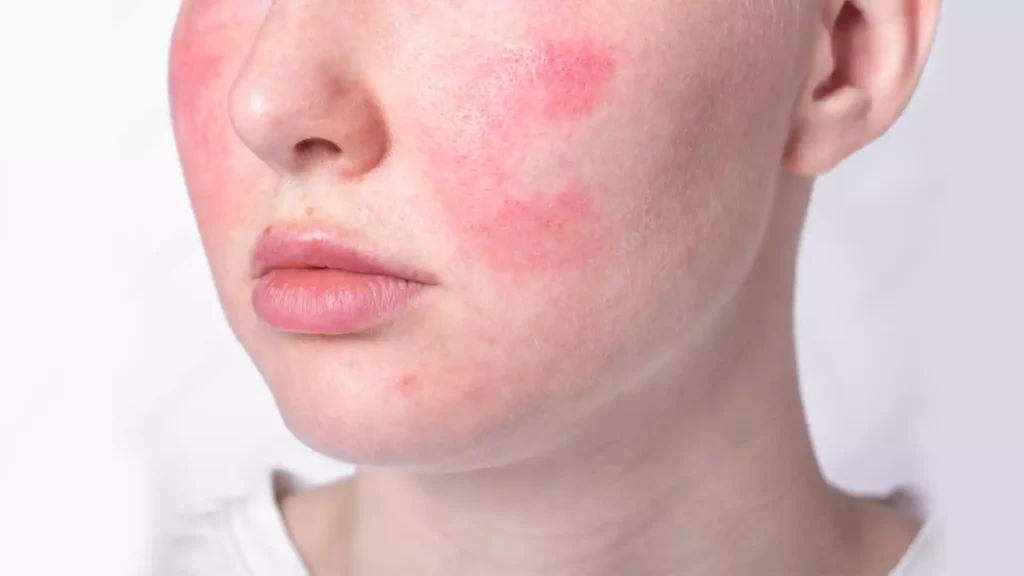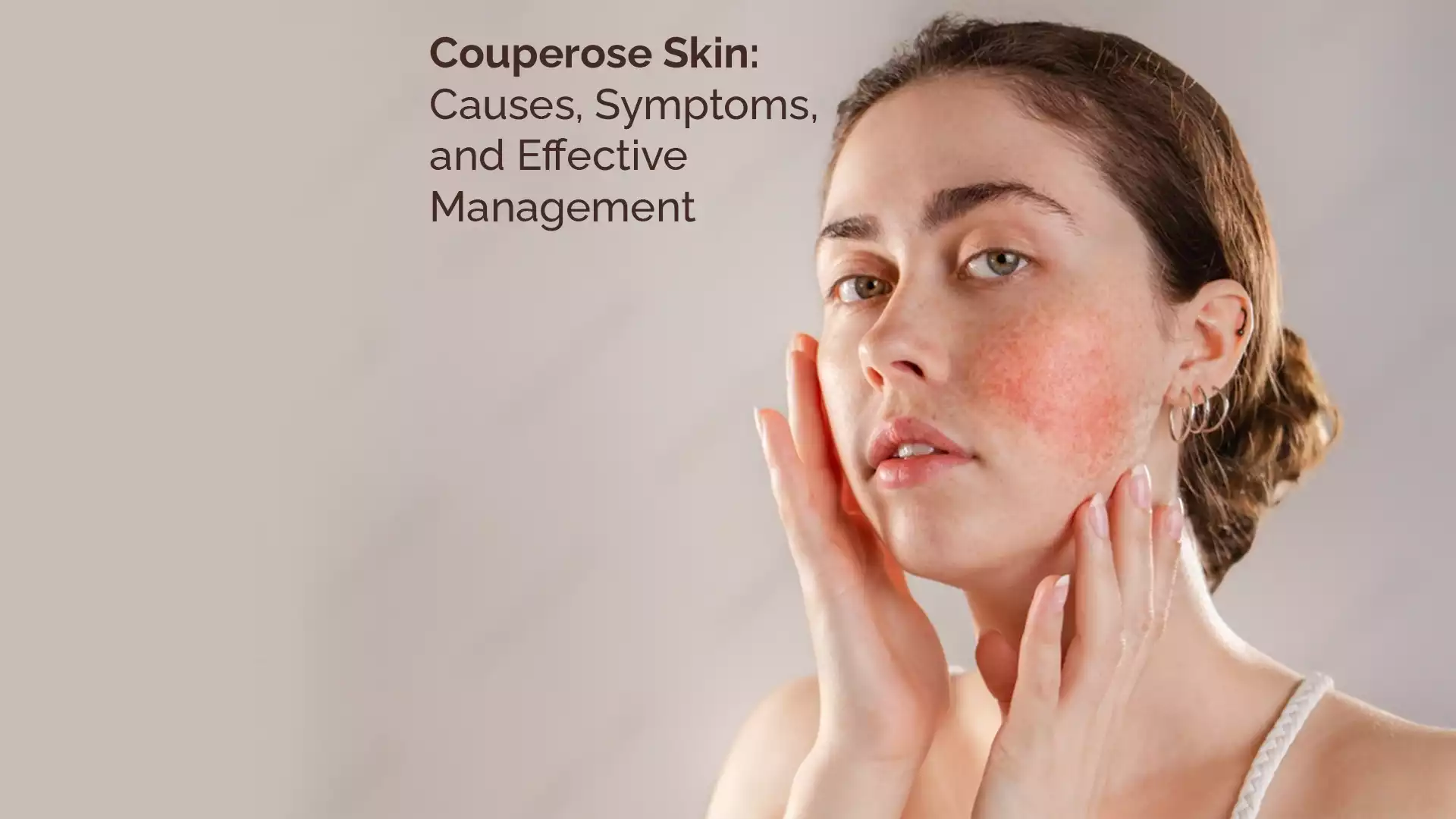Are you tired of suffering from the presence of dilated blood vessels and chronic redness on your face? This specific condition is commonly referred to as the Couperose Skin. It can make you feel self-conscious and uncomfortable in your own skin.
Fear Not! Easy Peasy Skincare brings you plenty of ways to manage this condition and get back to feeling confident and beautiful again.
In this blog, we will explore what is couperose skin, what causes it, how you can effectively manage it and many more.
Without further ado, let’s find it out!
What Is Commonly Called Couperose Skin
It is a common inflammatory skin disorder, mainly characterized by the appearance of small, dilated blood vessels ( telangiectasia ) on the skin particularly on the cheeks and nose. These visible blood vessels can give the skin a red, flushed appearance, and can be accompanied by sensitivity and dryness.
While couperose skin is not a serious medical condition, it can be a source of embarrassment and discomfort for those who suffer from it.
What Is The Scientific Term For Couperose Skin
In scientific terms, this skin disorder is termed as acne rosacea.
Do You Know?
According to Google, Over 14 million people in the U.S. struggle with Rosacea – which can affect anyone but is more common in fair-skinned individuals, women, and AFAB people.
How Come I know I Am Suffering From Couperose Skin?

Well! couperose skin is indicated by various factors. We listed 4 significant symptoms for you
- Persistent redness: Couperose skin is characterized by a constant redness, often resembling a flushed or blushing appearance.
- Visible blood vessels: Dilated blood vessels become visible as fine, spider-like veins on the affected areas.
- Sensitivity: Couperose skin may be prone to increased sensitivity, leading to heightened reactions to certain skincare products or environmental factors.
- Flushing and Blushing: Some individuals with couperose skin may experience frequent episodes of flushing or blushing, often triggered by heat, cold, spicy foods, or alcohol.
IMPORTANT!
If you’re experiencing any of these symptoms, it’s important to speak with a dermatologist or skincare professional to get an accurate diagnosis and treatment plan.
Causes of Couperose Skin:

Genetic Predisposition: This skin can have a hereditary component, meaning it may run in families.
Environmental Factors:
- Sun Exposure: Prolonged exposure to UV rays can weaken blood vessel walls, contributing to the development of couperose.
- Extreme Temperatures: Exposure to extreme heat or cold can trigger flare-ups in individuals with this skin.
- Harsh Skincare Products: Certain skincare products containing harsh ingredients or alcohol can aggravate the condition.
Lifestyle Factors:
- Alcohol and Spicy Foods: Consumption of alcohol and spicy foods has been associated with these skin flare-ups in some individuals.
- Stress: Chronic stress can worsen existing couperose skin symptoms.
How to Cure Couperose Skin?

You can treat your skin condition in the best way by following the prescribed treatment options of Easy Peasy Skincare.
Skincare:
When it comes to skincare products, there are several ingredients that can be beneficial for couperose. Look for products that contain ingredients like niacinamide, vitamin C, Apple Cider Vinegar and green tea extract, as these can help to reduce redness and inflammation
- Gentle Cleansers
- Moisturizers: (Non-comedogenic)
- Sun Protection
Medical Treatments:
- Topical Medications: Prescription creams or gels containing metronidazole or azelaic acid can reduce redness and inflammation
- Oral Medications: In severe cases, oral antibiotics or isotretinoin may be prescribed by a dermatologist.
- Laser and Light Therapies: Treatments such as intense pulsed light (IPL) or laser therapy can target and minimize visible blood vessels.
Lifestyle Changes:
- Avoid Triggers: Identify and avoid triggers such as spicy foods, alcohol, and extreme temperatures
- Stress Management: Incorporate stress-reducing techniques such as meditation, deep breathing exercises, or engaging in hobbies to manage stress levels.
- Gentle Skincare Routine: Opt for skincare products specifically formulated for sensitive skin and avoid abrasive scrubs or harsh ingredients.
- Protect from Environmental Factors: Wear a scarf or use a barrier cream during extreme weather conditions to shield the skin.
- Healthy Lifestyle: Adopt a balanced diet rich in antioxidants, stay hydrated, and engage in regular exercise to promote overall skin health.
Seeking Professional Advice:

Certain home remedies and lifestyle changes may help manage couperose, it is essential to consult a dermatologist for proper diagnosis and personalized treatment plan. They can provide guidance based on the severity of the condition and recommend suitable medical interventions or procedures.
FAQS:
What is couperose skin?
Couperose skin, or acne rosacea, is characterized by persistent redness and visible blood vessels on the face.
What are the common indications of couperose skin?
Persistent redness, visible blood vessels, and increased sensitivity are common indications of couperose.
How is couperose skin different from acne rosacea?
Couperose and acne rosacea are the same condition, with “couperose skin” often describing the visible redness and blood vessels.
What causes couperose skin?
Genetic predisposition, environmental factors (sun exposure, extreme temperatures), and lifestyle choices (harsh skincare products, alcohol, stress) can cause it.
How can I treat it?
Treatment involves gentle skincare practices, medical interventions (topical or oral medications, laser therapy), and lifestyle changes (avoiding triggers, managing stress).
Can couperose skin be cured?
There is no known cure, but the condition can be effectively managed and symptoms minimized with appropriate care.
Is couperose skin a serious condition?
It is generally benign but can impact self-esteem. Seeking professional advice is recommended for effective management.
Final Thoughts
Living with couperose skin can be challenging, but it doesn’t have to be. Understanding its causes, symptoms, and available treatment options can empower individuals to take proactive steps in managing their condition.
By adopting a gentle skincare routine, making lifestyle modifications, and seeking professional advice, it is possible to minimize the impact of couperose skin and promote a healthier complexion.
Remember, every individual’s journey with couperose skin is unique, and with the right care, it is possible to maintain a healthy and confident appearance.

